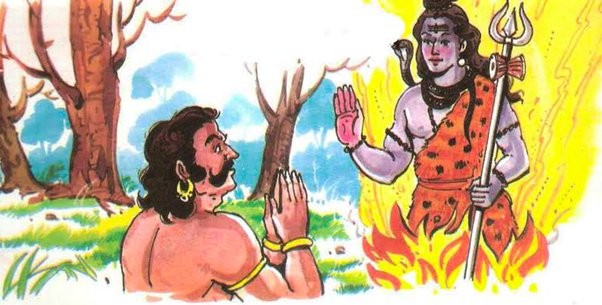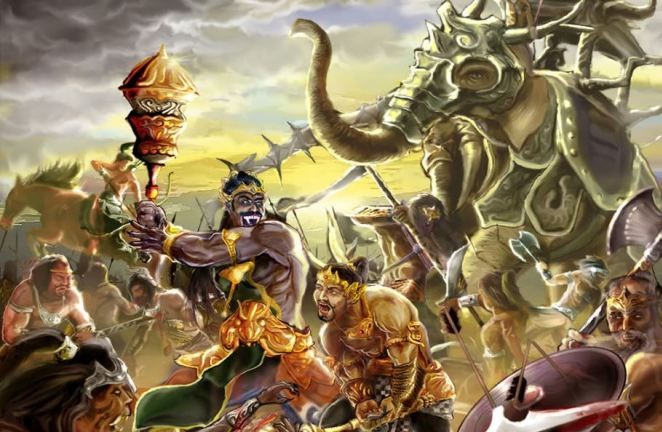- Edited
Birth of Bhaṇḍāsura
At this point of time, Citrakarma, the commander of one of the Rudragaṇas (gaṇa means an attendant) one day started toying with the ash of the burnt Manmatha and prepared a doll out of it. He took this doll to Śiva.
Śiva’s intentions are indeed unfathomable. As soon as the doll neared Śiva, it sprang to life and the boy thus born prostrated before Śiva and Citrakarma.
Citrakarma was overwhelmed with joy. He gave the boy the upadeśa of Śatarudriya Mantra and asked him to undertake penance. When the penance reached the stage of fruition, Śiva appeared before him. He asked Śiva to grant him a special boon “anyone who fights against me should immediately lose half of his strength and that strength should be added to my strength. None of the weapons of my opponents should be able to bind me” was his request. Immediately Śiva granted the boon and added, “I am also bestowing on you the boon of ruling the kingdom for sixty thousand years”. After giving these boons, Śiva disappeared.

He became surprised and a bit apprehensive by the words of Śiva. But soon he forgot it. Brahmā, who was witnessing all this, grew frustrated and swore “Bhaṇḍa”,“Bhaṇḍa” (meaning shame, shame). From then on, he got the name “Bhaṇḍa”. Because of his qualities he became an Asura (demon) and entered the domain of Asuras. This is how he got the name ‘Bhaṇḍāsura’.
In the mean time, from the remnants of the ash of Manmatha were born two demons – Viśukra and Viṣaṅga. These two became the main brothers of Bhaṇḍāsura. In addition, thousands of rākṣasas (demons) were born out of the ash of Manmatha. All of them became followers of Bhaṇḍāsura. They formed a strong army of 300 akṣauhiṇīs (one Akṣauhiṇī consists of 21,870 chariots, 65,610 horses and 109,350 foot soldiers).
Having come to know about the birth of thousands of rākṣasas, Śukrācārya came there and assumed the role of the Guru for all those rākṣasas and initiated them to undertake regular anuṣṭhānas (daily rituals).
He also summoned Māya, the architect-builder of demons and asked him to create a new city in the province of Mahendra mountain. He named the city as ‘Śūnyaka Paṭṭana’. Śukrācārya asked all the demons to move to the new city. He crowned Bhaṇḍāsura as the king of the newly formed kingdom and made Viśukra and Viṣaṅga the princes of that kingdom.
Bhaṇḍāsura had four wives. 1. Sammohinī, 2. Kumudinī, 3. Citrāṅgī 4. Sundarī.
Under the guidance of Śukrācārya, activities like fire sacrifices, Vedic education and penance went on uninterruptedly in every house.
Tormenting of the three worlds
When the kingdom was well established, Bhaṇḍāsura called for a meeting of his
brothers and ministers and said :
Devatas (Gods) are our enemies. As long as Manmatha was alive, their lineage continued without any problems. They also enjoyed many pleasures.
Now, because of our luck, we have taken birth from the ashes of Manmatha. The gods are trying to see that Manmatha is born again. We should not allow that to happen. Before they try anything like that, we should kill the devatas.
But, if we go in our present form, we can not win. Let us therefore assume the form of air and enter their bodies.
After having so entered their bodies, let us dry up their body fluids, especially the semen.
If semen dries up, the strength of other tissues and organs will automatically diminish. Then they will automatically be annihilated.
Let us torment the beings of all the three worlds by entering their bodies in the form of air and by drying up their body fluids.
Hearing this, the entire army of the demons cheered with joy. Without wasting much time, Bhaṇḍāsura and his army of 1000 akṣauhiṇīs assumed the invisible form of air and entered the heaven.

First, they entered the minds of the devatas and dried up their mental faculties. Subsequently they entered the face of the devatas, robbed them of their beauty and made them ugly looking. All the women and men in the heaven became impotent and sterile. Not only that, their love for one another was also lost. They lost enthusiasm to do anything.
Even the plants and animals suffered the same fate. Viśukra, along with his troops entered Bhūloka (earth) and delivered the same treatment to the beings there. People on the planet earth stopped smiling. They lost all happiness. No one had any respect for another. No one thought of helping the other. They lost interest in their activities. The situation was stone-like, devoid of any life and feelings.
Viṣaṅga, along with his troupes entered Rasātala (one of the seven nether worlds). He created similar havoc there also. In the Nāgaloka (land of serpents) everyone became afflicted with grief for no apparent reason. Everyone started hating everyone else. Everyone became drained of energy and potency.
Rasa, the fluid principle is the basis for the accomplishment of the four-fold aims of life (puruṣārthas). Let us see how.
Rasa itself is the form of Paramātmā, the Almighty.
From Rasa are created Śukra (sperm) and Śoṇita (ovum). These two are collectively called as Vīrya.
From vīrya comes Kānti (radiance), Utsāha (enthusiasm), Ullāsa (happiness), Dharma (righteousness), Dayā (compassion), Prītī (love), Buddhi (intellectual capabilities), Vikāsa (development), Parākrama (valour), Śāstra Vijñānā (scientific knowledge), Kalā Āsakti (interest in arts), Saundarya Dṛṣṭi (proper concept of beauty) etc.
In plants, the Rasa enhances the fire energy, which is hidden in them. Only when the fire energy is harnessed, the plants can branch out and bear flowers and fruits. Because of this fire principle, the dried logs catch fire easily and burn
The Vedas have declared that beings can experience happiness only if Rasa is present.
Rasa is nothing but Prāna (vital energy).
Having known all these secrets, Bhaṇḍāsura devised the plan of entering the bodies of all beings in the form of air and drying them up
Vasanta, the close friend and associate of Manmatha observed this immediately and consoled Rati (Manmatha’s wife). He said “Even the sun, the moon and the stars have lost their brilliance. Even Goddess Pārvatī seems to have become dull and has engaged in tapas. Therefore, the day when your dead husband will come to life again is not very far. That day will come very soon. So, stop grieving.”
On hearing this, Ratidevī prepared to undertake penance.
Devatas go to Śrīhari
In the heaven, all the devatas including Brahmā, could not comprehend what was going on and what had caused the situation. Not knowing the remedy for their hardship, they approached Śrīhari (Viṣṇu). When they finally reached the abode of Viṣṇu, they saw that even he was sitting still with his eyes closed. It appeared as though he was merged in the bliss of Suṣupti. After the devatas praised his glory for a long time, Śrīhari slowly opened his eyes.
“What is this? Why are you all looking drained of your energies?” asked Śrīhari. He called everyone by their names and said :
Your present condition is due to the invisible foul play of Bhaṇḍāsura.
Even I have lost the affinity for Goddess Lakṣmī. What to say about other lesser beings?
Myself, Brahmā and Rudra are Karaṇa Puruṣas (causal beings for the manifest creation). Even then, because we are also inhabiting this creation, even we can not escape the torture of Bhaṇḍāsura.
There is however one Almighty God who is beyond this manifest Brahmāṇḍa (universe). He is called Mahā Śambhu. Parāśakti is constantly in his company.
He is devoid of form. He is not dependent on anything. He has no modifications. He is greater than the greatest. He is the ultimate.
He is not influenced by the foul play of Bhaṇḍāsura, who is born from the ashes of Manmatha.
He can rescue us from our difficulties. Therefore, let us all take refuge in him and praise him. Follow me.
So saying, Śrīhari led all the devatas to the brim of the Brahmāṇḍa. There was a huge wall like fence there. The devatas summoned the celestial elephants to break the wall. After toiling continuously for one year, a breach was formed in the wall. After passing through the breach, they saw Cinmayākāśa, which was Nirālamba (independent), Nirañjana (untainted) and which was devoid of the five elements.
They all stood in that Cinmayākāśa and sang the glory of Mahā Śambhu, who was of the form of Cidākāśa. Then Mahā Śambhu appeared before them. He was dark like clouds. He had two hands. He was holding a Śūla (spear) in one hand and a Kapāla (skull) in the other. He had three eyes. Parāśakti also appeared before them. She was holding akṣamāla (rosary of beads) and pustaka (book) in Her hands. She was bright and cool like the moon.
Source: 4th Day (13-10-99) of Sri Devi Navaratri Festivals ’99, Avadhoota Datta Peetham – Mysore

